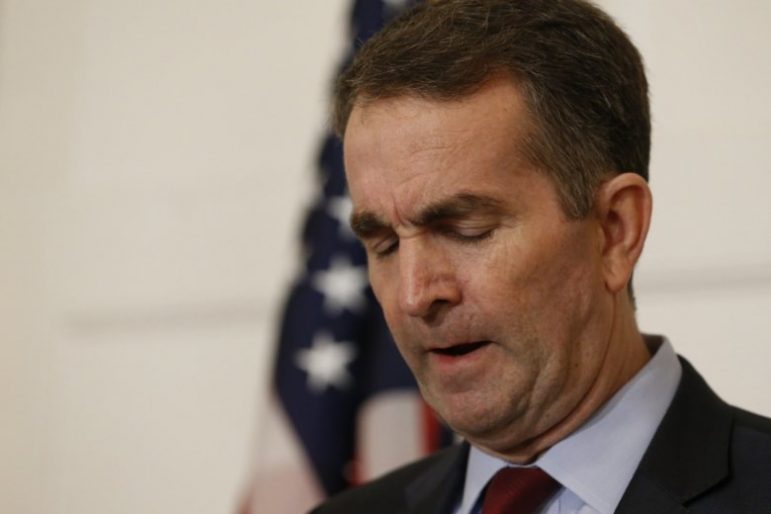I warn my teenager daughters that their snaps, texts and tweets — the modern-day equivalent of the handwritten notes I passed across high school physics class—are so much more dangerous than their predecessors because texts and social media posts last forever.
In the last few weeks, the Governor of Virginia and I learned how wrong we adults are on this issue and how naïve we were to think our pasts would not haunt us as badly as a tenth grader’s late-night sexting pic.
You must be familiar with Governor Ralph Northam and the “blackface” picture on his medical school yearbook page from 1984. In a coincidence of epic 80s proportions, my high school friend recently unearthed a note from 1986 in which I supposedly called another classmate a homophobic slur. It wasn’t a public comment and yet it reminded me of Governor Northam. These were acts of hate or stupidity from the recent past and we both instinctively responded with denial. That couldn’t have been me, I thought. No. Way.

Governor Northam denied it too. At first he apologized. But the next day he backtracked on the yearbook picture while admitting to another blackface incident as part of a Michael Jackson costume around the same time. Mid-press conference he almost started moonwalking (I can’t make this stuff up) and then bumbled his way through the rest of his groveling tour.
Many have called for the Governor’s resignation. Many have mocked his inarticulate and insincere apology. I have been reading and reserving judgment.
On the one hand I’m heavily into second chances, being an attorney to convicted criminals for many years. On the other hand I work hard for racial justice and often speak to groups about implicit bias and its profound impact on society.
Granted, blackface is explicit racism. It becomes ominous when posing next to a buddy in a pointy white hood and matching white robe. But I consider blackface for a Michael Jackson costume in the 1980s to be insensitive and ignorant – not necessarily an expression of racial animus.
Consider the fact that even today, sports fans dress up in “redface” to attend Washington Redskin games and events for teams that continue to use Native American people as their mascots, and racial slurs for their entertainment. I am talking 2019! To me, 1980’s Michael Jackson pales compared to current day adults painting their faces red and tomahawking through a football game, behavior that is insanely racist. I believe the sports fans that defend their mascots with iron-willed determination are fundamentally different from Governor Northam. His handling of the blackface incidents of his past — however bumbled — could point us in the right direction.
Governor Northam says he has committed to a reconciliation tour. He shambled his apology trek so far.
But talking about race is hard. Most people suck at it actually, especially white people. That’s why they don’t do it. And that’s why we lack meaningful, introspective dialogue on race.
To really redeem himself, Governor Northam must lead the conversation. If he looks deep into his past views on race, his insensitivities and even the outright racism he internalized growing up in the capital of the Confederacy, that will constitute a good first step. He says he is ready to do the hard work to win back the trust of his constituents. He’s even talking about white privilege! For the governor of a Southern state to show an example–however bumbling and cringey — of claiming our own role in racism — our mistakes and our benefits — and discussing them openly, that would be a good start.
The Governor must also act. Civil Rights leader and activist, the Rev. William Barber calls on him (and those of us commenting on him) to focus less on blackface and other “cultural racism” and instead “[d]eal with the systemic racism. Voting rights. Economic inequality.” And a rising environmental crisis in a historic African American community in Union Hill, Virginia: Dominion Energy’s plan to build a major natural gas pipeline pumping station there. The Governor could step in to support black and environmental leaders who have objected to the project for years. That would be using his white privilege.

Like the Governor, I denied the homophobic label I used in high school. I thought the person who wrote that was obviously insensitive, prejudiced, and cruel. But when I open up about my past, how far I’ve come and acknowledge how far I still need to go, I hope that gives others the opening to admit their mistakes, ask questions and learn to do better.
Shutting down the conversation–through harsh labels, social media bashing, or the threat of professional death–stops progress. No action toward dismantling systemic racism will happen that way. Like the teenage brain is hardwired for idiocy, every American’s brain has been hardwired with implicit (and sometimes explicit) biases.
It’s going to be embarrassing and uncomfortable to begin an honest conversation about our biases, but it’s also necessary: we all have a lot of growing up to do.

Shanti Brien is an educator, consultant, writer and co-founder of Daylight Justice.
Great piece, Shanti. I’ll bet every single one of us has cringeworthy moments in our past. They are embarrassing and maybe even shameful, but they can also remind us how much we’ve (hopefully) learned and grown. I think our culture is stuck in the “gotcha” moment of exposing others. We need to let people be honest about their imperfect past so they can atone, be forgiven and we can all move forward.
Great piece Shanti!
Your writing is clear and thought provoking and always makes me think about hard subjects!
Thank you for a very thoughtful discussion. We need ongoing conversations about race no matter how uncomfortable those conversations may be.